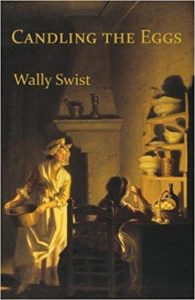Candling the Eggs
 Candling the Eggs,
Candling the Eggs,
by Wally Swist.
Shanti Arts Publishing, 2017,
132 pages, paperback, $15.95,
ISBN: 978-1-947067-07-3
Wally Swist’s eleventh book-length collection gathers about seventy poems covering everything from poignant childhood recollections to hints and guesses about mystic nature, and from ruminations on the poet’s literary life to the “entrepreneurial predator” Donald Trump. It’s hard to know exactly what to make, overall, of such a panorama of topics and rhetorics.
Some of Swist’s childhood recollections are quite touching, including the title poem, which recalls times when a neighbor sheltered the boy from the drunken rage inside his own house: “Mrs. Dornisch,/a septuagenarian, and myself, perhaps/aged three, candled the eggs, as two/anchorites might have applied gilt to/the letters in an illuminated manuscript.” Other metaphorical candlings of the past include two toward the end: “Grand Wizard” details a small boy’s instinctive sense of fear and loathing during a Ku Klux Klan parade, and then “Distance” seems to continue the five-year-old’s memories, until a child-mythic drive from Georgia to Connecticut turns into his mother’s sudden death from a stroke. This might be the most affecting poem in the collection, in part because of the context created by its pairing with “Grand Wizard.”
Much of the rest of the collection does not have this kind of coherence. In one sequence, for example, which the table of contents instructs us to group together, we move from “They” (a chant-like accusation of “the proponents/of shortsighted edicts/that don’t serve the republic,/since we no longer live in a democracy”), to “Angels of the Night” (a straight-up nature poem about moths), to “Imminence” (recalling the author’s fleeting sighting of Jerzy Kosinski and the mixed personal and political feelings that went with it), to “The Wood” (a mystically tinged recollection on first and last sights of a friend), to another nature poem, “The Iris,” to “Reawakening” (a wandering recounting of a mini-spiritual journey while looking at a fish pond), and onward like that. Each one a viable poem in itself, but like the compilation you made of your favorite songs that turned out to be inexplicably disjointed, it’s not really clear, to me at least, how they fit together in tenor, tone, or rhetoric.
Dropped into these groupings are mentions of famous poets, such as Galway Kinnell, Frank O’Hara (“Lunch Poem,” in memory of), and Michael McClure (“He walked into the bookstore/as if he had just been giving stage directions to/the actors who were performing in The Beard ”). The rhetoric of poems like “McClure” and some of the nature poems owes debts to Walt Whitman. Others are so prosaic they look as if they were found in journals or letters, as in “Offering Guidance”: “No artist/or writer, nor human being ever born into this/world, ever had a clear path to the mountaintop.” Made of an almost sententious kind of prose-speak, it lacks the cadences of “Lunch Poem” or “McClure.”
Scattered about are references to a number of mystical traditions, from Transcendentalism (Swist lives in Amherst, Massachusetts) to Taoism and Buddhism. The whole book wends an array of different ways. “Straying maps the path,” Rumi observed, and I guess that’s one way to meaningfully bundle this highly variegated collection in your mind.
“Candling the Eggs” is available from online book sellers and Shanti Arts of Brunswick, Maine. Two other collections by Swist, “The Treadle and the Light: Selected and New Poems” and “The Map of Eternity,” are also scheduled for publication by Shanti Arts.
—Dana Wilde

